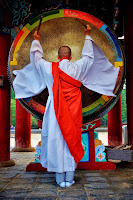If there is something that every foreigner who plans to stay in the long term in South Korea should do, it would be a
temple stay. It's something easy to do and affordable for everyone and it will help everyone to get a better understanding of the background of this country and its culture.

The two days I spent in Beopjusa were in my case something I planned for a long time. I didn't know what to really expect for such experience. I wanted to open window on one of the face of the deep identity of the korean society and its culture. I wanted also to share some moments with the local monks and to try why they decided to change so radically their lifes. I was lucky enough to have a korean friend who decided to follow for this short trip and who gave me very helpful information and explanations. If most of the temples always have some monks who can speak english and help to interact with the foreigners, it will be far easier and more convenient to experiment temple stay with a korean friend.
The first day we arrived, we were welcomed in very new traditional buildings dedicated for the temple stay guests. Don't expect high comfort standard: you will basically share the daily life of the monks. Girls and boys dormitory are of course separated, no hot water for the shower, vegetables and fruits for lunch and dinner, carpets on the floor for the beds and nights are shorts. However you have lot of free time during your days, so you either walk around the temple, discuss with the monks, or meditate.
During our walk around the temple, we were invited by two monks to join them for the tea... we didn't expect such experience and we really appreciated the time spent with them (well, especially my friend as I didn't understand the discussion!). I was surprise to see that one of the two monks prefered to stay quiet and didn't talk a lot. I tried to ask them why they decided to be monk, and i felt that this question made them uncomfortable. Instead of explaining us their reasons or what convinced them to change their life, they prefer to detail what were the main differences between being a monk and having a "normal" life.
Taking pictures inside the temples is not allowed, and we have to understand that the temple is above all a temple, and not a touristic attraction. I was surprised to see that monks are using bells and drums to announce the day and night ceremonies. This is especially impressive during the night... around 3am. Waking up in the night, in the middle of the mountains and walking alone with the song of the drums toward the main temple is something unusual! Bowing several times in front of the Budha in silence was something hard for me as I'm really not used to do such things. Because I couldn't speak and understand korean, I didn't get a good understanding of the ceremony. This was especially disapointed when the monks explained their conception of the life and took the time to answer to several questions asked by the locals.


My best memory of this experience was when the monks decided to bring us to a river located next to the temple. There, they asked us to sit on the rocks and to listen to them. They talked in front of us for almost one hour, in the middle of the river and of the mountains. We were alone, and there was no noise coming from behind the mountains: we were really far from the modern cities and environment. At the end, they finally sit with us and we shared watermelons. This was unexpected and funny.
I was not fully satisfied by this temple stay, and the main reason was the fact that I couldn't really understand what the monks were trying to explain us. Of course I will remember for a long time the temple and the days I spent there, but this is not exactly what I came for... I did the temple stay, but something was defenetly missing.

















